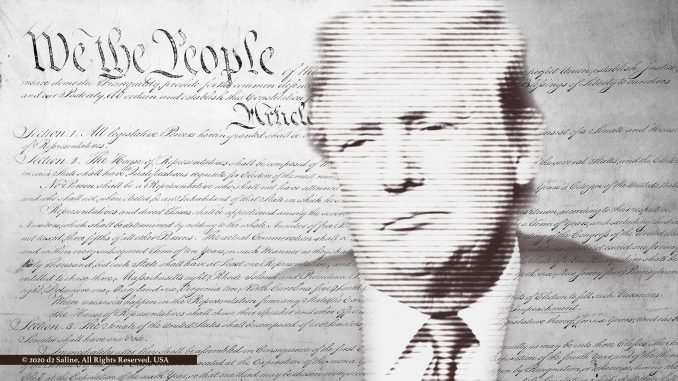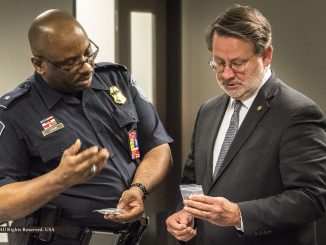
The Constitution of the United States of America has curiously emerged among higher topices for news coverage and discussion in 2020. This year, its aspects associated with the Presidency appear to have merited the most reason for attention. [1]
January kicked off with pointed focus on Article II, Section 4, when Democratic controlled House of Representatives voted to impeach President Donald Trump without having garnered the support of a single Republican Member of Congress. By early February, trial on those charges was held the Republican controlled Senate, resulting in acquittal. [2-4]
To date, only three US Presidents have faced impeachment, beginning with Andrew Johnson in 1868, followed by Bill Clinton, one-hundred, thirty years later. (No, Richard Nixon was never impeached.) None has ever been removed from office. [5-7]
Neatly, some might think, impeachment and its associated trial is a process that uniquely finds persons from all three coequal branches of our federal government together under the same roof for a time. Another, following current tradition, is the annual State of the Union Address. [8,9]
That, too, was specified by the United States Constitution in Article II, at Section 3.
As bookend to 2020, decision as to which candidate will occupy The White House for the next four years will only partially be made forty-seven days from now by vote of citizenry. Article II, Section 1 routes this through “electors” who are tasked with actual casting of ballots that will be used to determine who will ultimately serve as that next President of the United States. [10-14]
This is also how it is possible — and has happened in the past — for one candidate to win the popular vote, but fail to secure majority in the Electoral College, and thus lose the Presidential election. [15,16]
Like so many other aspects of life, issues surrounding the COVID-19 pandemic have provided fodder for candidate differentiation in approaches to response. Democratic candidate Joe Biden, for example, has talked about the possibility of a nationwide “mask mandate” to come with his administration. [17-21]
Can any President actually do that? Legally? How do you know? By what authority?
Once again, first and foremost: Look to the Constitution. [22-23]
Not that citing the seminal document of our republic will cause clouds to part, angels to sing, and finally render need for any further debate moot. Even the candidate himself has found reason to visit both sides of the mask issue. [24]
Mid-summer, Josh Blackman took a look at this question from a different Constitutional angle: Due process. Article V set forth the process through which that document might be changed or updated. Consequent “amendments” would then carry weight equal to that of the original. Thus begat Amendment V. [25,26]
No person shall be … deprived of life, liberty, or property, without due process of law ….
Revisiting that subject matter post-Democratic National Convention, Mr Blackman noted that “… Vice President Biden has proposed that the federal government should require people to wear masks,” emphasizing that he found it “unclear if he was referring to an act of Congress, or an executive order. [27]
“I’ll assume that he was referring to the former, rather than the latter,” he then assured his readers.
But, of course.
With all this having led up to September 17, 2020, as commemoration of “the formation and signing … of the Constitution of the United States,” it should be noted that even something so apparently incontrovertable is not without circuitous history. [28]
Originally called “I am an American Day,” an Act of Congress signed by President Harry Truman in 1940 set aside the third Sunday in May each year “in honor of the American people, especially those who had recently become citizens of the United States.” [29]
Association with the United States Constitution and the thirty-nine brave delegates who signed it in 1787 did not come until decades later, with what is now fully titled, “Constitution Day and Citizenship Day.” [30]
References
- “The Constitution of the United States: A Transcription” National Archives.
- “On Historic Impeachment Votes, Three Democrats Cross Party Lines to Vote ‘No’” Catie Edmondson (December 18, 2019) The New York Times.
- “Articles of Impeachment now transmitted to United States Senate, Congressman Tim Walberg provided context” Dell Deaton (January 22, 2020) Saline Journal.
- “Donald Trump celebrates impeachment acquittal by taunting Democrats with video” Michael Collins and David Jackson (February 5, 2020) USA Today.
- “Here are all the US presidents who have been impeached” Pamela Engel, Lauren Frias, and James Pasley (February 6, 2020) Business Insider.
- “Former local Congresswoman offered practical overview of Presidential impeachment during ‘Free College Day’” Dell Deaton (September 30, 2019) Saline Journal.
- “Articles of Impeachment” Watergate.
- “How is power divided in the United States government? – Belinda Stutzman” TED-Ed (April 12, 2013) YouTube.
- “History, Evolution, and Practices of the President’s State of the Union Address: Frequently Asked Questions” Michael Greene and Maria Kreiser (January 29, 2020) Congressional Research Service.
- “How to Become President of the United States” USAgov (September 12, 2016) YouTube.
- “Electoral College Fast Facts” History, Art & Archives, United States House of Representatives.
- “Does your vote count? The Electoral College explained – Christina Greer” TED-Ed (November 1, 2012) YouTube.
- “Why the Electoral College is Essential” PragerU (April 30, 2019) YouTube.
- “Abolishing The Electoral College Would Be More Complicated That It May Seem” Miles Parks (March 22, 2019) NPR.
- “How Hillary Clinton Won the Popular Vote But Lost the Election” (November 9, 2016) Billboard.
- “How Trump could lose the popular vote by 5M and still win” Harry Enten (September 2020) CNN.
- Coronavirus (COVID-19) (home page).
- “Coronavirus Disease 2019 (COVID-19)” CDC: Centers for Disease Control and Prevention.
- “Novel Coronavirus Reports” CDC.
- “Joe Biden Acceptance Speech at 2020 Democratic National Convention” C-SPAN (August 20, 2020) YouTube.
- “Biden says he believes president has ‘legal authority’ to implement mask mandate” Molly Nagle (September 16, 2020) ABC News.
- “Face-Covering Requirements and the Constitution” Patrick C Diaz and Polly J Price (June 3, 2020) American Constitution Society.
- “The constitutionality of federal mask mandates” John Yoo (July 27, 2020) American Enterprise Institute.
- “Joe Biden walks back his national mask mandate, admits it would probably be unconstitutional” Paul Sacca (September 7, 2020) The Blaze.
- “Mask Mandates and Broccoli Mandates” Josh Blackman (June 28, 2020) Reason.
- “The Bill of Rights: A Transcription” National Archives.
- “The Constitutionality of a Federal Mask Mandate” Josh Blackman (August 14, 2020) Reason.
- “History of Constitution Day” Constitution Facts.
- “The History of Constitution Day” Constitution Facts.
- “Constitution Day and Citizenship Day” Library of Congress.



